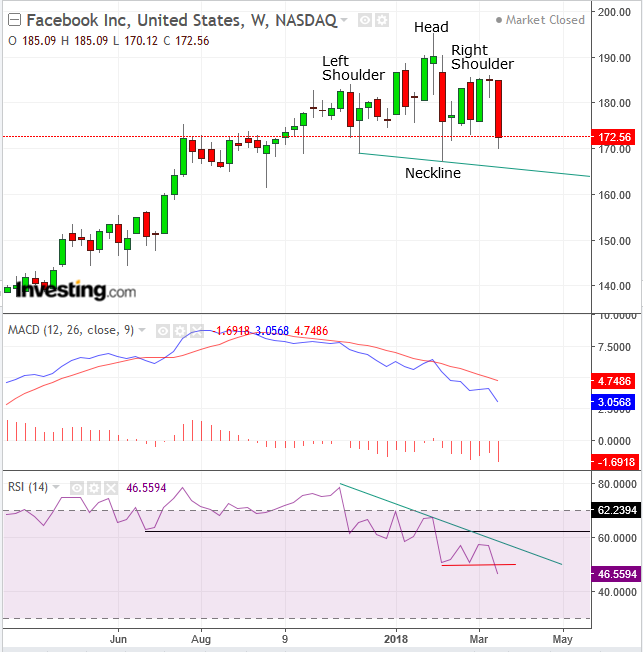Yesterday, disgusted investors erased $37 billion of Facebook's (NASDAQ:FB) valuation after news broke over the weekend that global regulators were preparing to investigate allegations of a massive 'data breach,' on the platform, though it's a term the giant social media company rejects. This latest headwind could be far more damaging and a lot more controversial than the problems Facebook encountered last May, when it was revealed that it had experienced metric glitches for which it was overcharging advertisers.
This selloff occurred after accounts from the New York Times and the Observer of London reported that in 2014, Cambridge Analytica, a UK-based data mining company that provides voter profiling, among other services, to customers, accessed information from 50 million Facebook users. Apparently, Cambridge Analytica paid users a small sum to download a personality quiz app on Facebook which then collected details from each of their Facebook accounts as well as surreptitiously pulled in information from their friends. The company, which has ties to the Trump 2016 election campaign, including huge donations made by Cambridge Analytica's founder Robert Mercer, harvested and exploited the user data for political purposes.
Paul Grewal, Facebook’s Vice President and deputy general counsel is denying foul play. He insists that users “knowingly provided their information, no systems were infiltrated, and no password or sensitive pieces of information were stolen or hacked. Everyone involved gave their consent.”
While the attorney might be technically correct, the fact that the company immediately severed ties with Cambridge Analytica when it learned that data had been scraped without Facebook's knowledge says otherwise. The deeper question is whether Facebook is involved in unfair practices including exploiting users for marketing and political reasons, for the benefit of paying customers.
Regulators Gear Up To Investigate
Facebook doesn’t just record user clicks and likes. It also collects browsing histories.
Data which the platform doesn’t already have on its own about users, such as financial information, is purchased. Facebook expends massive resources on how to better harvest and exploit its users, who perhaps more aptly should be called “those being used.”
Regulators in the US, EU, UK and other countries are now ramping up to investigate these apparently shady activities, in order to see if any laws have been breached and whether new stronger regulations should be enacted.
As the drama expands, the case surely won't be helped by a 2010 chat in which 19-year old Facebook founder Mark Zuckerberg crassly ridicules the gullibility of his first users in handing him their private data, such as emails, pictures and addresses. This may now come back to bite him.

Facebook may be forming a H&S top, four months in the making. A down-sloping neckline demonstrates demand scarcity, failing to support prices sufficiently to draw a straight neckline.
The MACD provided a sell signal already back in late September. This signal has been tested twice, when the shorter MA (blue) failed to cross over the longer MA (red) mid-November and late January.
The RSI provided three negative divergences, underlying the lack of momentum behind the price advance since the $175, July 24 peak was breached. Yesterday’s price closed at $172.
- It completed a top in late January, ahead of what might become a price top.
- Since November, it had produced descending peaks and troughs, the makings of a downtrend, while the price has consolidated, suggesting the next move would follow the momentum.
- This week’s price fell below the February low, while the price has yet do so.
Still, to call it a top, the neckline must be “breached,” and since its down sloping, the price may have to chase it down. The question that remains is, was FB topping months ahead of the data breach news? And if so, why?
